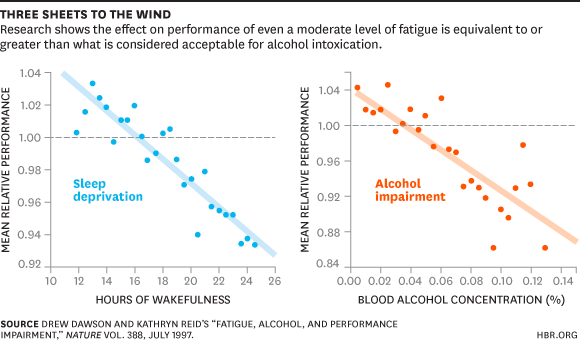Sleep & Fatigue
Episode #5 of the course How to manufacture the greatest sleep of your life by Austin Gill
In episode 3, we discussed how sleep debt cripples your body’s ability to use energy even when it’s available—an impairment that elevates disease risk.
Another side effect of hormonal or metabolic dysregulation that can be equally as dangerous is fatigue accompanied by loss of productivity.
The National Highway Traffic Safety Administration estimates that fatigue is a cause in 100,000 auto crashes and 1,550 crash-related deaths each year in the US.
Quality sleep allows your body to clean out the metabolic waste (junk left over from the process of creating energy) from the previous day, ensuring that when you feed your body again, its systems are primed to absorb and deliver energy where it’s needed.
Without sufficient sleep, you can’t create enough energy no matter how much you eat.
Sleep loss weakens your immune system. And when the immune system is weak, it takes what it needs to regain its strength from your body’s energy stores. This depletes the energy available to perform basic daily tasks.
Sleep debt also intensifies physical pain, or aches, because it prevents your body from fully refreshing the neurotransmitters that suppress pain. Now your body is working extra hard to shush the pain—another energy drain.
Depriving your body of sleep for long periods of time can be even more detrimental to your health. 48 hours without sleep actually impairs oxygen intake and anaerobic power, which affects your athletic potential, physical coordination, stamina, cognitive abilities, and focus (Engle-Friedman, 2014).
Sleep deprivation is like being drunk. And being drunk is bad for productivity (Kirby, 2013).

Burning the midnight oil or putting in a few extra hours to get ahead “just for a few weeks” is a losing proposition. It will significantly decrease the quality of your work output and life.
To be your best at whatever you’re doing, sleep more and sleep better.
Sleep Improvement Tip: Turn the Temp Down
Your body’s ability to change its internal temperature, known as thermoregulation, is linked to how you move through the various sleep cycles. As the night progresses, your core temperature drops.
Consequently, cool environments are best because they mimic your body’s natural temperature changes during sleep.
65 to 69 degrees Fahrenheit (18 to 21 degrees Celsius) is the ideal range for sleep—lower is better.
Just be sure to keep your extremities warm. Cold hands and feet are a sign of poor blood circulation and cause wakefulness (Heller, 2012).
Consider wearing loose-fitting socks or placing a warm water bottle by your feet. Cold room, warm body.
Tomorrow we’ll be talking about how sleep influences your mood and why darker is better.
Sleep tight.
Recommended book
No More Sleepless Nights by Peter Hauri
Share with friends

